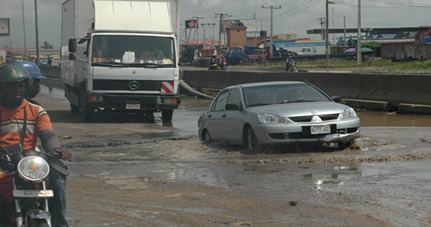The Federal Government is planning to refund N5bn out N300bn owed state governments that have spent their resources to fix federal road in their respective states.
The proposal is contained in the budget document which has been submitted by President Muhammadu Buhari to the National Assembly.
The fiscal document also indicated that the government had allocated a total sum of N60bn for special intervention and constituency projects in the 2016 fiscal year.
These amounts were provided for in the 2016 budget under the subheading of capital supplementation.
The document did not, however, provide details of the constituency projects and the states that would benefit from the refund on the federal road projects.
But as of June 2015, a total sum of N300bn was said to be owed states by the Federal Government for various road projects.
The Nigeria Governors Forum had on June 18, 2015 made a request to the President for the refund of money spent on roads belonging to the Federal Government.
The Chairman of the forum who is also the Governor of Zamfara State, Abubakar Yari, said the refund became imperative since the economies of most of the states were in bad shape.
He had said, “We all know that the economy of the country is in a bad shape. So, what we agreed was that a number of state governors have executed various road projects for the Federal Government. So, we ask the Federal Government to settle that backlog owed us so we can move forward.”
Some of the states that are reportedly being owed are Rivers (N105bn), Lagos (N60bn), Jigawa (N17bn), Ogun (N4bn), Oyo (N40bn), and Kwara (N18bn).
Others are Abia (N10bn), Cross River (N12bn), Plateau (N14bn) and Bayelsa (N8.7bn).
Buhari had while presenting the budget said in order to deliver development objectives, the Federal Government increased the capital expenditure from N557bn in 2015 to N1.8tn in 2016.
He told the lawmakers that for the first time in many years, capital expenditure would represent 30 per cent of the nation’s total budget, adding that this would be increased in the future.
Meanwhile, the Abuja Chamber of Commerce and Industry has said that despite the bleak economic outlook and predictions for Nigeria, the 2016 budget proposal would stimulate the recovery of the nation’s economy.
The President, ACCI, Mr. Tony Ejinkeonye, said this in a statement made available to our correspondent in Abuja.
He said despite the prediction by the International Monetary Fund that the global price of crude oil might fall below $20 per barrel; the Nigerian economy still had enough potential to survive the decline in oil revenue.
He said, “Despite the prediction that oil price may fall as low as $20 per barrel, there is still huge potential for inclusive growth and sustainable development in the coming year.
“For the country to actualise its goals, we need a measure of fiscal discipline and strict budgetary control monitoring and implementation.”
He added that what the entire nation needed was a clear policy with faithful implementation as well as a leaner government policy, which involved eliminating of waste and a significant reduction in the recurrent expenditure.

